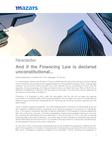
And if the Financing Law is declared unconstitutional...
In a recent press release, the Ministry of Finance stated that the cost of the eventual unenforceability of the Financing Law would amount to approximately one thousand trillion pesos. Thus, invoking legal certainty, the economic effect derived from such decision by the Constitutional Court and the regularity of the proceedings, the National Government is confident that Law 1943 of 2018 will be declared constitutional, a decision that according to information from the Court will be made during the sessions of the week of October 7.
Therefore, it is important to ask, under the assumption that the law will not pass the rigorous examination of constitutionality, which planning aspects may be taken into account considering the different measures that were introduced by the Financing Law and that would be removed from the legal system.
As an example, regarding dividends, Law 1943 established the mechanism of withholding at source with respect to dividends paid to companies as an advance payment of income tax for individuals, thus, in the case of companies that plan to declare dividends in 2019 based on financial statements with cuts of less than one year, it would be advisable to explore the possibility of doing so next year thus avoiding the withholding at source that today, in force of the law, is 7.5% in the case of untaxed dividends paid to domestic companies. This same logic must be followed for dividends paid abroad, whose withholding tax went from 5% to 7.5% thanks to this law and which, if declared unconstitutional, would represent a saving of two and a half points.
On the other hand, it should be remembered that the law enabled the possibility of taking the VAT paid in the acquisition or formation of real productive fixed assets as a tax discount in the income tax, with which, anticipating investment projects to be executed in 2019, reviewing the possibility of subscribing financial leasing contracts (considering the ultra-active nature of the ruling), will generate important benefits for taxpayers.
Likewise, it will be necessary to rethink the debt operations, since, according to article 118-1 of the ET modified by Law 1943 of 2018, interest associated to debts that exceed twice the net worth of the previous year will be rejected only when the creditor turns out to be economically related. If the law is declared unenforceable, we will return to the anti-technical thin capitalization rule introduced by Law 1607 of 2012, which punishes any type of excessive financing regardless of the relationship with the creditor.
For those who are taxed by the presumptive income system, it would be advisable not to make tax readjustments for the year 2019 pretending the increase of the fiscal cost of the assets, since they will have a greater base subject to income tax since, the long awaited dismantling of the taxation by the presumptive income system, from the gradual decrease of the rate (1.5% for the years 2019 and 2020 and 0% as from the year 2021), will leave us in the place where we were with a rate of 3.5% with the affectation that it also entails in the application of the limit of tax discounts. The taxation of those taxpayers who decided to submit to tax normalization will also be affected.
If it is planned to dispose of a property in the remainder of the year, it will be important to evaluate the realization of this operation in the following year, thus achieving the moderation of the effects of Article 90 of the ET. Thus, aspects such as: i) the reference margin to determine the commercial value will not be 15% as it is currently, but 25%. Likewise, the generation of the 2% consumption tax will be avoided when the value of the operation exceeds 26,800 UVT; ii) the solemnity in the public deed regarding the declaration under oath in relation to the sale price; iii) the limitation to the recognition as cost in the case of acquisitions made in cash or through other operations such as exchange or payment in kind, among others.
The same will occur in the disposal of shares that are not listed on the stock exchange, since the referent of the operation will no longer be 130% of the intrinsic value but 115%, which will generate a lower profit susceptible to be taxed with income tax or occasional gain depending on the time of possession of the fixed asset (less or more than two years, respectively).
Thus, anti-abuse and anti-deferral rules introduced by the Financing Law, such as the effect on indirect disposals; the obligation to declare certain assets by the founder, constituent or originator before legal vehicles in which the benefits are conditioned or are constituted as irrevocable; the taxation of the beneficiaries of private equity funds, among others, would not apply after the declaration of unenforceability, if applicable, as well as those beneficial rules (v.g., exemptions of the private economy, etc.), which would not be applicable after the declaration of unenforceability. exemptions for the orange economy and incentives for the development of the countryside, the special taxation of the simple regime, deduction of taxes paid, among others).
Here are just a few effects of what can be anticipated so that the decision of the Constitutional Court on the Financing Law does not take taxpayers unawares.


